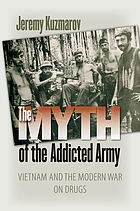
With the return of thousands of service personnel from the Middle East, the issues surrounding their reentry to society and wherewithal going forward is frequently front-page news. Educational benefits for veterans are a centerpiece of those concerns, and Mark Boulton’s Failing Our Veterans: The GI Bill and the Vietnam Generation roots the political controversy over funding for those benefits in tensions that linger in public memories of Vietnam and its veterans. More affecting still is the news commentary about the failure of “the war on drugs” and the need for legislative and judicial changes in that field. In The Myth of the Addicted Army: Vietnam and the Modern War on Drugs, Jeremy Kuzmarov reveals that “war” to have been born out of the Nixon administration’s preoccupations with veterans returning from Vietnam with addictions to hard drugs. Kuzmarov debunks the idea of widespread drug use in Vietnam and explains how the portrayal of strung out veterans also contributed to the denigration of their image. Edwin Martini’s Invisible Enemies: The American War on Vietnam, 1975-2000 documents the ways the US battlefield war was continued by other means once the shooting stopped. The front lines of this postwar war were drawn by US policies that isolated Vietnam for trade relations and a cultural campaign to write a narrative of “mutual destruction” into the public memory of the war. As noted above, Martini’s Agent Orange is essential to considerations of reparations for herbicide use in Vietnam and regulation of its use going forward. David Zierler’s The Invention of Ecocide: Agent Orange, Vietnam, and the Scientists Who Changed the Way We Think about the Environment is particularly valuable as a humanities-science crossover study that can inspire the interdisciplinary leanings of faculty and students and inform the thinking of policy makers.
 The Myth of the addicted army: Vietnam and the modern war on drugs
by
The Myth of the addicted army: Vietnam and the modern war on drugs
by